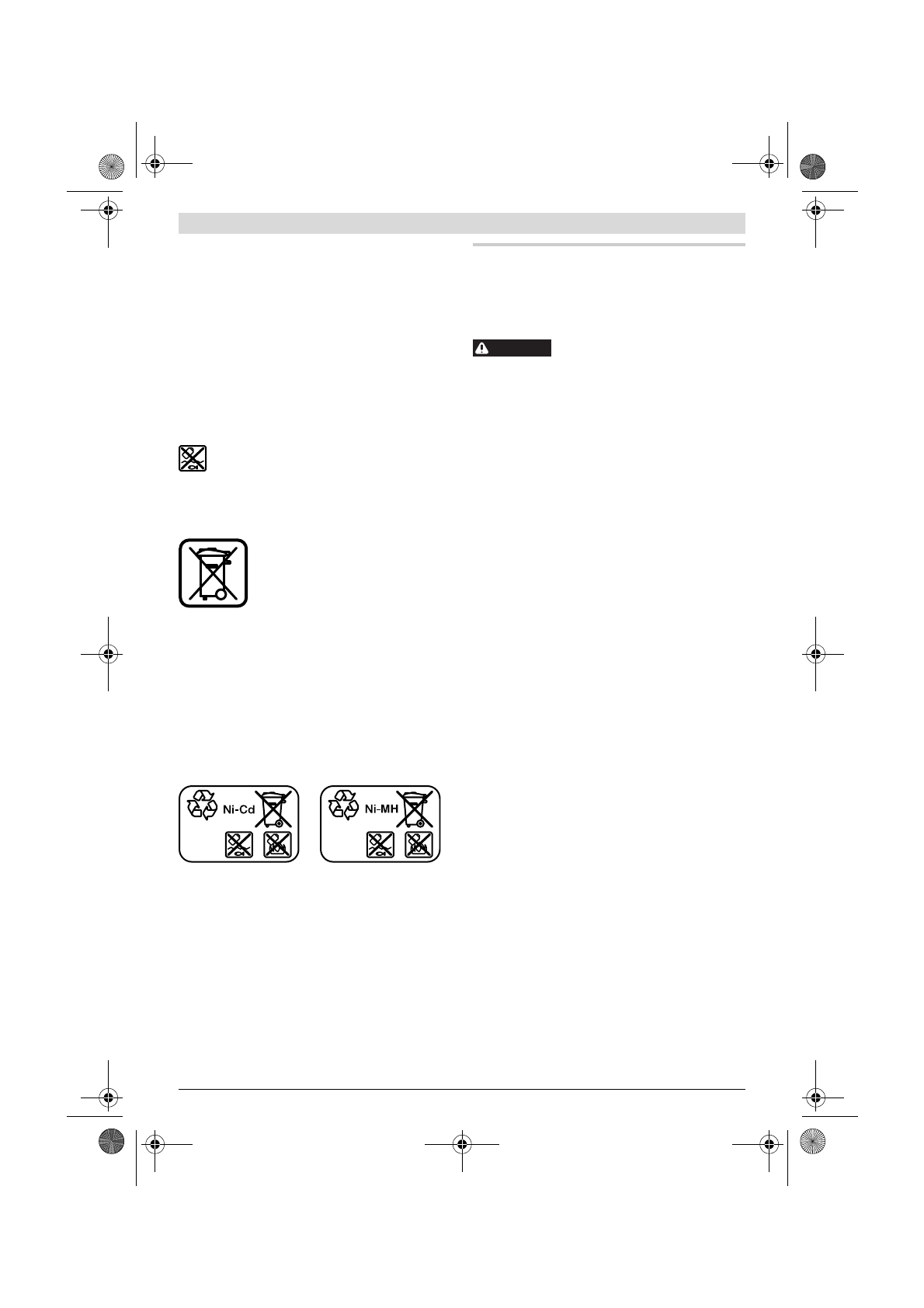Bosch GSB 12 2 Conductor impactante – Manual de instrucciones en formato pdf, léalo en línea gratis. Esperamos que le ayude a resolver cualquier duda que pueda tener al utilizar el aparato.
Si aún tiene preguntas, escríbalas debajo del manual de instrucciones.
"Estamos cargando el manual" significa que debe esperar a que se cargue el archivo para poder leerlo en línea. Algunos manuales son muy pesados y el tiempo que tardan en aparecer depende de su velocidad de internet.

English |
11
Bosch Power Tools
2 609 140 727 | (11.4.12)
Österreich
Tel.: +43 (01) 7 97 22 20 10
Fax: +43 (01) 7 97 22 20 11
E-Mail: service.elektrowerkzeuge@at.bosch.com
Schweiz
Tel.: +41 (044) 8 47 15 11
Fax: +41 (044) 8 47 15 51
Luxemburg
Tel.: +32 2 588 0589
Fax: +32 2 588 0595
E-Mail: outillage.gereedschap@be.bosch.com
Entsorgung
Elektrowerkzeuge, Akkus, Zubehör und Verpackun-
gen sollen einer umweltgerechten Wiederverwertung
zugeführt werden.
Werfen Sie Elektrowerkzeuge und Akkus/Batterien nicht in
den Hausmüll!
Nur für EU-Länder:
Gemäß der europäischen Richtlinie
2002/96/EG müssen nicht mehr ge-
brauchsfähige Elektrowerkzeuge und ge-
mäß der europäischen Richtlinie
2006/66/EG müssen defekte oder ver-
brauchte Akkus/Batterien getrennt gesam-
melt und einer umweltgerechten Wiederverwendung zuge-
führt werden.
Nicht mehr gebrauchsfähige Akkus/Batterien können direkt
abgegeben werden bei:
Deutschland
Recyclingzentrum Elektrowerkzeuge
Osteroder Landstraße 337589 Kalefeld
Schweiz
Batrec AG
3752 Wimmis BE
Akkus/Batterien:
Ni-Cd:
Nickel-Cadmium
Achtung: Diese Akkus enthalten Cadmium, ein hochgiftiges
Schwermetall.
Ni-MH:
Nickel-Metallhydrid
Änderungen vorbehalten.
English
Safety Notes
General Power Tool Safety Warnings
Read all safety warnings and all in-
structions.
Failure to follow the warnings
and instructions may result in electric shock, fire and/or seri-
ous injury.
Save all warnings and instructions for future reference.
The term “power tool” in the warnings refers to your mains-
operated (corded) power tool or battery-operated (cordless)
power tool.
Work area safety
f
Keep work area clean and well lit.
Cluttered or dark areas
invite accidents.
f
Do not operate power tools in explosive atmospheres,
such as in the presence of flammable liquids, gases or
dust.
Power tools create sparks which may ignite the dust
or fumes.
f
Keep children and bystanders away while operating a
power tool.
Distractions can cause you to lose control.
Electrical safety
f
Power tool plugs must match the outlet. Never modify
the plug in any way. Do not use any adapter plugs with
earthed (grounded) power tools.
Unmodified plugs and
matching outlets will reduce risk of electric shock.
f
Avoid body contact with earthed or grounded surfaces,
such as pipes, radiators, ranges and refrigerators.
There is an increased risk of electric shock if your body is
earthed or grounded.
f
Do not expose power tools to rain or wet conditions.
Water entering a power tool will increase the risk of electric
shock.
f
Do not abuse the cord. Never use the cord for carrying,
pulling or unplugging the power tool. Keep cord away
from heat, oil, sharp edges and moving parts.
Damaged
or entangled cords increase the risk of electric shock.
f
When operating a power tool outdoors, use an exten-
sion cord suitable for outdoor use.
Use of a cord suitable
for outdoor use reduces the risk of electric shock.
f
If operating a power tool in a damp location is unavoid-
able, use a residual current device (RCD) protected
supply.
Use of an RCD reduces the risk of electric shock.
Personal safety
f
Stay alert, watch what you are doing and use common
sense when operating a power tool. Do not use a power
tool while you are tired or under the influence of drugs,
alcohol or medication.
A moment of inattention while op-
erating power tools may result in serious personal injury.
f
Use personal protective equipment. Always wear eye
protection.
Protective equipment such as dust mask,
non-skid safety shoes, hard hat, or hearing protection used
for appropriate conditions will reduce personal injuries.
WARNING
OBJ_BUCH-1124-003.book Page 11 Wednesday, April 11, 2012 11:41 AM
Contenido
- 7 Español; Instrucciones de seguridad; Advertencias de peligro generales para herra-; ADVERTENCIA
- 8 Instrucciones de seguridad para taladradoras y
- 9 Descripción y prestaciones del pro-; Utilización reglamentaria; Información sobre ruidos y vibraciones
- 10 Declaración de conformidad; Montaje; Carga del acumulador; Operación; Puesta en marcha
- 11 Instrucciones para la operación; Mantenimiento y servicio; Mantenimiento y limpieza
- 12 Servicio técnico y atención al cliente; Português; Indicações de segurança; Indicações gerais de advertência para ferramen-; ATENÇÃO
¿Tiene más preguntas?¿No ha encontrado la solución a su problema en el manual o tiene otros problemas? Haga su pregunta en el siguiente formulario con una descripción detallada de su situación para que otras personas y expertos puedan responderla. Si sabe cómo resolver el problema de otra persona, ayúdele :)




























































